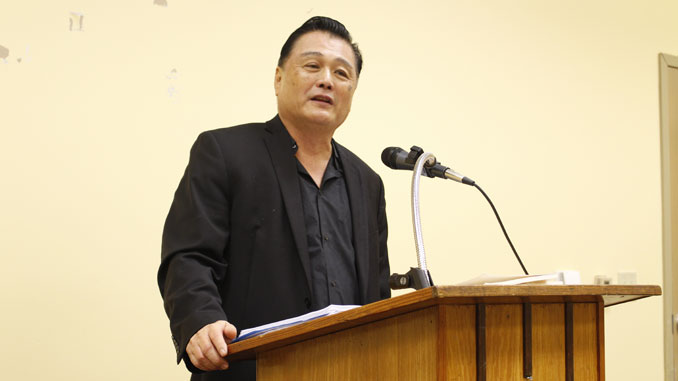
By Deja Dennis
“When people say they don’t see color, that is self-delusion,” read Author David Mura during a poetry reading on Nov. 9th at 7 p.m. at Xavier University. Mura, who is a Japanese-American Poet, Novelist, Playwright, Critic, and Performance Artist from Chicago, Ill., shared excerpts from his 2014 book The Last Incantations: Poems, to Xavier students. His upcoming book in 2018 is titled A Stranger’s Journey: Race, Identity and Narrative Craft in Writing where he takes a step back to take a look at experiences of race as a shared journey for people of color.
Mura became a writer by accident. He thought he would go to Law School like his father wanted, but he was exposed to poetry in college when he enrolled in a class that studied major British poets. He began reading other famous poems and crafting his own. He found himself writing a lot about race and identity. Flunking his LSAT exam, the test to get in to Law School, was his first act of rebellion.
Mura is a Sansei, which is a third generation Japanese-American. Both of his parents were placed in internment camps in the 80s, something that his family is too ashamed to discuss.
“When you go to jail for stealing, you don’t steal anymore. What do you do when you go to jail because of your race?” Mura asked the audience. He said that his parents tried to assimilate into White culture because they thought their race was a crime. Mura lived in a predominantly White neighborhood and attended a predominantly White school. He was raised to deny his Japanese culture. When his childhood friend told him that he thought of him as a White person, Mura responded, “That’s what I wanted to be.”
During the Jim Crow Era, Asian-Americans were grouped in with White people. They were expected to sit in the front of buses and trains. Mura told the audience about his grandmother that did not agree with how Black people were treated. She did the opposite of what Rosa Parks did, she refused to sit in the front of the train. When the conductor asked her to get up she responded, “I Japanese, I enemy.”
“My father didn’t learn racism from his mother,” Mura said. He explained that his parents wanted to assimilate as a way to survive, not because they hated themselves and other people of color.
In high school Mura wasn’t exposed to many authors of color. In college, he began to realize his own identity by reading Black authors like, James Baldwin, Alice Walker and Amiri Baraka. Mura started to explore the idea of racial identity by making new friends and connecting with their experiences.
“When you become friends with different kinds of people, their histories enter you,” Mura said. He sees America as strangers from all over the globe coming together. In many of his poems, he talks about interracial couples and his children who are mixed race. His writing style is also a mix of many different forms.
“I just follow where my mind goes,” said Mura. In his book, The Last Incantations: Poems, he praises hip-hop and some influential African-Americans like Malcom X, James Brown, Richard Pryor, and Alice Walker. He isn’t afraid to look at other cultures and celebrate them. He believes that this is something all writers should do.
“He is a great speaker, a wonderful and unique poet. He is genuine and sincere,” said Dr. Biljana Obradovic, an English Professor at Xavier, who organized Mura’s visit. Her poetry students had recently read Mura’s book and were eager to meet the author and gain insight.
“We’re not taught creativity, it’s about experiment,” Mura said as advice to writers. He encourages students to not be afraid to write about heavy topics like race and identity. In his new book, he continues to explore this idea and new styles of writing.
“The principle for creativity,” Mura said “is failed often.”
Recommended For You.
















Be the first to comment